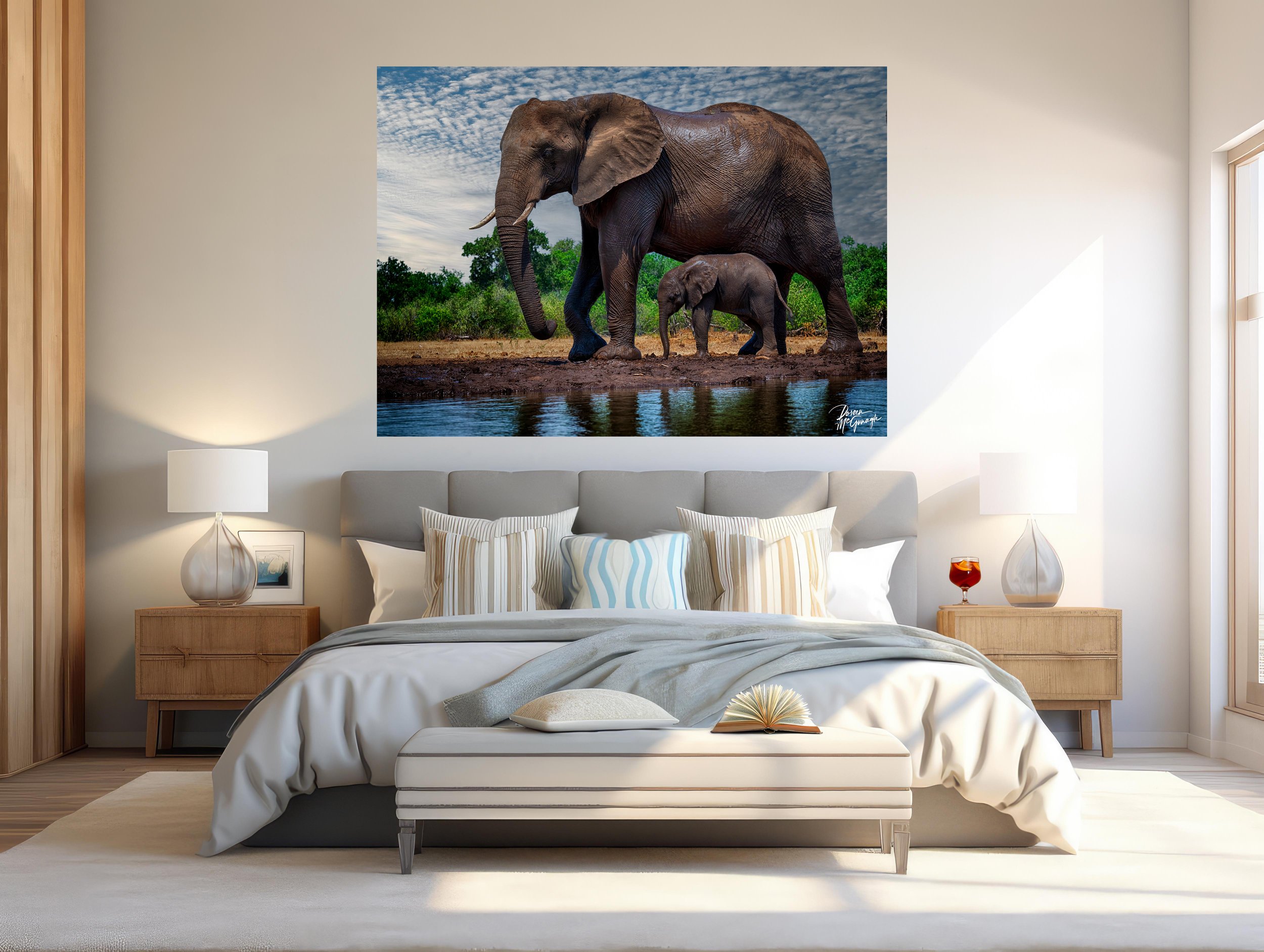Capturing Emotion: The Art of Photography
Photography is more than just capturing a moment. It's about capturing emotion, telling a story, and evoking a response from the viewer.
The art of capturing emotion in photography is a skill that requires practice, intuition, and a deep understanding of human emotion. It's about more than just technical skill; it's about connecting with your subject and conveying their emotion through your lens.
In this guide, we'll explore techniques and approaches to capturing emotion in photography. Whether you're an amateur photographer or a seasoned professional, you'll find valuable insights to help you create more expressive and impactful fine art photos.
The Power of Emotion in Photography
Emotion is a powerful tool in photography. It can transform a simple image into a compelling narrative, drawing the viewer in and creating a lasting impact.
Enduring Bonds, Echoes of Protection
Set against a backdrop of lush greenery and dramatic skies, this African elephant art brings the wilds of Botswana into your home. The intricate details in the elephants' skin and their mirrored reflections in the water create an immersive viewing experience, epitomizing high-quality fine art photography. Ideal for a photography gallery or as part of a nature-inspired collection, this piece of landscape photography resonates with the serenity and beauty of the animal kingdom.
Botswana 3490-206 c2024 | Africa | Learn more
Understanding the power of emotion in photography is crucial for creating meaningful art. It's not just about capturing a beautiful scene or a striking subject; it's about capturing the emotion that scene or subject evokes.
By harnessing the power of emotion, you can create photographs that resonate with viewers on a deeper level, making your work more impactful and memorable.
Building Rapport for Genuine Emotions
Capturing genuine emotions requires a connection with your subject. This rapport can be built over time, through conversation and understanding.
It's about making your subject feel comfortable and at ease. When they trust you, they're more likely to express their true emotions.
This connection can transform your photographs, making them more authentic and emotionally resonant.
Lighting and Mood: Setting the Emotional Tone
Lighting plays a crucial role in setting the mood of a photograph. It can evoke a range of emotions, from joy and warmth to sadness and mystery.
Experimenting with different lighting conditions can help you discover new ways to express emotion. Remember, it's not just about brightness, but also direction, color, and contrast.
Mastering the art of lighting can significantly enhance the emotional impact of your photography.
Composition: Framing the Feeling
Composition is the arrangement of elements within a photograph. It's a powerful tool for directing the viewer's attention and conveying emotion.
The rule of thirds, leading lines, and framing are just a few techniques that can enhance the emotional message of an image. Each can guide the viewer's eye to the emotional center of the photo.
Remember, rules are meant to be broken. Don't be afraid to experiment with composition to create unique and emotionally compelling images.
The Decisive Moment: Timing in Emotional Photography
Timing is crucial in capturing emotion in photography. It's about waiting for that perfect moment when the emotion is most raw and genuine.
Patience is key. Sometimes, you have to wait for hours for that one shot that perfectly encapsulates the emotion you want to convey.
Color Theory and Emotion in Art Photography
Color plays a significant role in conveying emotion in art photography. Different colors can evoke different feelings, from the calmness of blue to the intensity of red.
Understanding color theory can help photographers use color to enhance the emotional impact of their images. It's a powerful tool in the hands of a skilled artist.
Black and White Photography: Emotion Through Contrast
Black and white photography offers a unique way to capture emotion. By removing color, the focus shifts to contrast, texture, and form, often enhancing the emotional depth of an image.
Caddo Lake 23
This particular morning we had a lot of cloud coverage while the sky’s threatened to drench us but it held off while we finished our morning session.
Caddo Lake 23 © 2022 | Texas | Learn More
This style of photography can create a timeless, classic feel, adding another layer of emotion to the captured moment.
Storytelling with Artistic Photography
Artistic photography often tells a story, creating a connection between the viewer and the image. This narrative element can evoke strong emotions, making the photograph more impactful.
The story can be explicit or subtle, but it's the emotional resonance that truly makes the image memorable.
Post-Processing: Enhancing Emotional Impact
Post-processing is a powerful tool for enhancing the emotional impact of a photograph. It allows photographers to emphasize certain elements, adjust colors, and create a specific mood.
However, it's important to use this tool wisely. Over-editing can detract from the authenticity of the emotion captured.
Conclusion: The Continuous Journey of Emotional Capture
Capturing emotion in photography is a continuous journey. It requires a blend of technical skill, intuition, and empathy.
The beauty of this journey lies in its endless possibilities. Each photograph is a unique expression of emotion, a testament to the power of this art form.
Spirited Design Studio Fine Art Gallery proudly presents the curated fine art photography of Doreen McGunagle. Her work celebrates the breathtaking beauty of the natural world, inviting you to pause, reflect, and forge a deep connection with the environment. Through her extraordinary images, Doreen McGunagle offers a window into the stunning landscapes and wildlife that fuel her creative in/spiration.
Whether you’re a seasoned art collector or exploring fine art photography for the first time, we invite you to explore our collection and discover the beauty that awaits. Every image tells a unique story, and Doreen is committed to capturing the awe-inspiring moments that make nature so remarkable. Embark on this journey with us and let the splendor of nature inspire and uplift your spirit.
Explore our online gallery of limited-edition conservation fine art prints. Join us in celebrating and preserving the beauty of our natural world through our exquisite collection of fine art photography.


